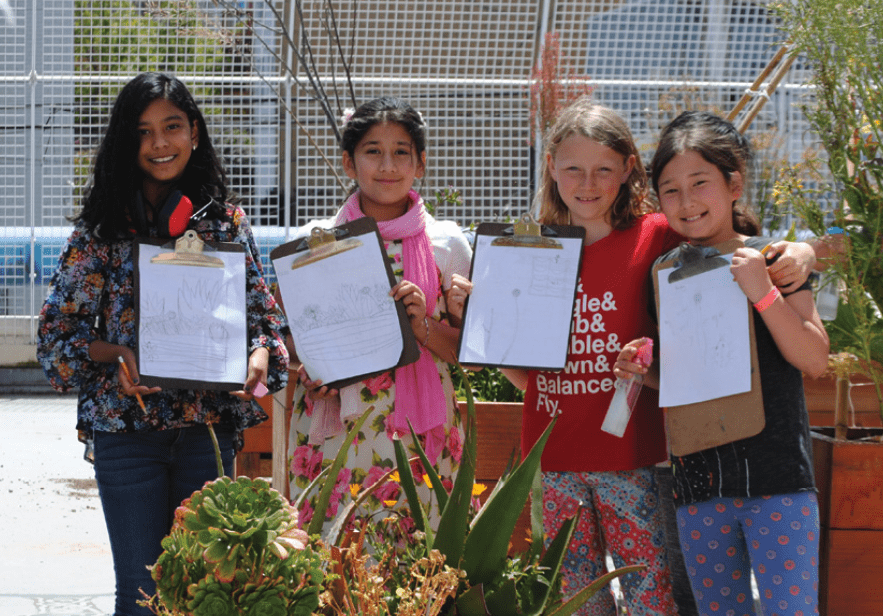CAELI is proud to announce the publication of its “Call to Action: Educating for a Green Economy.” Green Career Innovation Hub co-lead Dana Richards, explains, “The Call is meant to outline the first major steps needed to align the ambitious policy and economic commitments that flow from the governor’s office, the legislature, and sub-regional economies, on the one hand, with the on-the-ground realities, challenges, and opportunities in the TK–16 world of education and school-based workforce development. Along with narrowing the gap between greening the economy and greening education, the Call aims to help realize a commitment to preparing underrepresented and opportunity youth for the high-wage and high quality of life career pathways associated with decarbonizing the economy.”
In this Call to Action, the Green Career Innovation Hub has positioned the California Environmental Literacy Initiative (CAELI) to advocate for the creation of a statewide strategic plan to secure equitable access for TK–16 students to the high-growth, high-quality green careers essential to a sustainable future. The plan will guide and align education and workforce development programming, with the intent of attracting and strategically directing millions of dollars of public and private funding to a data-driven approach to strengthen California’s global leadership in the green economy.
A Collaborative Effort to Engage Diverse Perspectives in Developing the Call to Action
Inspired by Washington State Roadmap to a Green Economy Report, the Green Career Innovation Hub formed a working group in the 2022–23 CAELI season to develop a similar project for the state of California. Around this time, the CDE’s CA Workforce Pathways Joint Advisory Committee was circulating a draft of the California State Plan for Career Technical Education. Innovation Hub members saw that neither climate change or green careers were called out as a priority, despite the state’s policy commitments to emissions reduction and environmental justice. Therefore, the hub gathered a number of people to elevate this issue in public comments and advocate for the inclusion of climate change and green careers. Unfortunately, despite all the advocacy work of the Green Career Innovation Hub, the plan came out without a strong focus on any of these issues. The group then realized it needed not just a report but a stronger call to action that would rally the support of the very wide range of partners involved in career education—from the state’s agencies, community colleges, employers, community-based partners, and the TK–12 system itself.
This Call to Action became a core project for the Green Career Innovation Hub in 2023–24. To better understand the needs and aspirations of organizations involved in this system, the writing team gathered input from experts, educators, leaders, and service providers. They gathered feedback at the Educating for Careers Conferences in 2023 and 2024—first as a listening session, then to get feedback on draft versions of the recommendations from folks doing the work every day.
Throughout the writing process, CAELI members were instrumental in shaping the call to action, including Green Career Innovation Hub co-lead Dana Richards of Santa Clara County Office of Education and Innovation Hub members Kirk Anne Taylor of Climate Action Pathways for School, Nick Okafor of trubel&co, Douglas Pentland of Roots of Success, Siria Salas of The Energy Coalition, Alexis Fineman of SEI, and Kate Casale of The Student Conservation Association, as well as former hub members Tiffany Baca of Water Energy Education Alliance and Municipal Water District of Orange County and Dr. Doron Markus of the San Ramon Valley Unified School District.
Other valued contributors and reviewers included Dr. Elizabeth Bagley of Project Drawdown, Cindy Garcia Brown of Porterville Unified School District, John Carrese of the Centers of Excellence, Isabel Duran of the Los Angeles Regional Consortium, Anna Gomberg of We Share Solar, Dr. Raquel Pinderhughes of Roots of Success, and Andra Yeghoian and Amy Frame, both at Ten Strands.
Key Recommendations from the Call to Action
According to lead author Emily Courtney of Good Green Work, “Having worked in green career education and workforce development for more than fifteen years, we know that students, parents, teachers, community-based organizations, educators, and leaders need data-driven guidance on green careers—which careers are crucial for the environment, face labor shortages, are high quality for workers, and are accessible, in addition to where these careers are located. Without these answers, California risks continuing to undertrain and underinvest in green career recruitment and education. Greater clarity of direction and statewide coordination is critical to meeting our state’s climate goals and creating equitable access to green job and entrepreneurship opportunities that lead to economic mobility and equity.”
The primary recommendation from the call to action is to develop a “California Roadmap to Educating for a Green Economy,” which will serve as a data-driven strategic plan for green career education and workforce development. This statewide plan will be a living document that gets regularly updated, in particular to identify on a regular basis the priority green skills, occupations, and sectors in the dynamic green economy to align with career education expenditures and activities.
The Call to Action also recommends the “California Roadmap to a Green Economy” be designed and implemented as a coordinated component of the recently launched initiative to develop a statewide Master Plan for Career Education in California, which prioritizes pathways to careers in “education, healthcare, climate, and technology” (Master Plan for Career Education Core Concepts).
For efficient statewide coordination and implementation of the proposed roadmap, the call to action proposes empowering a green career education leader and a backbone organization. This leader, provided the necessary authority and funding, will align investments and programming across state agencies and education systems, focusing on providing industry-informed skills training and access to high-growth, high-quality green careers. Activities include guiding collaboration at state and regional levels; targeting investments and coordinating funding streams; providing regular updates to labor market research; shaping revisions of California’s CTE standards; supporting curriculum, teacher recruitment, and professional development; and bridging gaps in the green career pathway journey. Additionally, a statewide green career awareness and student recruitment campaign will be launched to attract students to pathways that prepare them for priority green careers.
The Call to Action also includes a curated collection of promising practice profiles to showcase innovative work already happening in our schools and to inspire leaders to build on and then take to scale what has already been proven successful.
How to Get Involved
Please join us for the launch webinar of our California “Call to Action: Educating for a Green Economy” white paper June 20 from 4-5:30 pm. The one-hour presentation featuring many of our white paper contributors will be followed by breakout room discussions. Register here in advance. Those who register will receive the recording and be included in outreach for further opportunities to advance the recommendations in this Call to Action.
CAELI is also seeking those with passion and expertise in this subject to join a working group to move forward the recommendations in the Call to Action. Use this form to let us know you’re interested and please help spread the work about this vitally important project!








